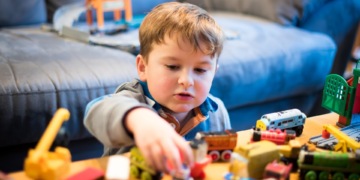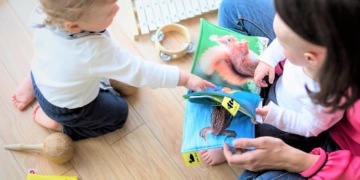Disruption of daily activities or the occurrence of panic episodes suggests that your child has a separation anxiety disorder (SAD), which is characterized by persistent and severe symptoms of worry over being apart from you. However, it might also be something else, such as an apprehension of the child’s other primary caregiver.
In childhood, goodbyes are typically accompanied by tears and rage. Around the time that a kid turns one, they may begin to exhibit symptoms of separation anxiety. Many find it difficult to leave their parents with someone else. Adults and teenagers have less separation anxiety. Read more below about separation anxiety in toddlers age 2.
Key Notes
- Separation anxiety happens when a child feels anxious when he cannot find his love near
- Children may attempt to prevent their parents' departure by clinging to them, screaming childish tantrums, or resisting being cared for by anyone else
- Your child's separation anxiety may be more severe if they have never been cared for by anyone other than you, is timid, or are experiencing other sorts of stress
- Identifying and treating the symptoms of separation anxiety disorder can decrease discomfort and make your child and your life easier
What Is Separation Anxiety?
A youngster who suffers from separation anxiety has significant distress whenever they are separated from their family and friends. Children worry that something horrible will happen to them or their loved ones if they don’t stay with their families. Young toddlers frequently experience separation anxiety.
The majority of toddlers go through a period of increased anxiety and clinginess between the ages of 18 months to three years. Separation anxiety, on the other hand, is far worse.
Separation anxiety must endure for at least four weeks before a child may be diagnosed—a youngster who suffers from separation anxiety worries and frets about being away from home or family members.
What Are The Causes Of Separation Anxiety?
A baby’s or child’s fear of being separated from their parents is a normal part of their development. Most two-year-olds can overcome their fear of being on their own. A diagnosis of separation anxiety disorder may reflect your own level of anxiety.
Parents and children may make each other anxious. A baby’s attachment link is how they perceive their primary caregiver. Your child’s healthy growth depends on the sense of security, understanding, and calm they have with you as a parent.
As a starting point, here are a few causes:
- Changing the setting might lead to separation anxiety, complicating the situation.
- Some stressful circumstances, such as a parent moving or acquiring a new job, might lead to separation anxiety.
- Children who believe they would perish without their parents have difficulty adjusting to life on their own.
- Parental overprotection can lead to an unhealthy dependence on the parent, making life difficult for the child.
What Are The Signs Of Separation Anxiety in Toddlers?
Babies frequently display signs of distress when caregivers leave. By clinging to them, throwing temper tantrums, or refusing to let anyone else care for them, children may try to prevent their parents from leaving. Separation anxiety disorder can occur when a loved one moves away due to stress in one’s life.
When a parent is out of the room, they may be frightened or unhappy, as well as when they are left alone at night or dropped off at daycare. A child is said to have separation anxiety disorder when their symptoms are awful for their age and make it hard for them to do everyday things.
- Unable to fall asleep on their own
- Dreaming about being separated on a regular basis
- Too much concern for a family member’s safety
- Worrying unnecessarily over being separated from loved ones
- Scared and apprehensive about being on one’s own
- Muscles that ache or are too contracted
- Anxiety for one’s own safety can be detrimental.
- Sleeping elsewhere, caring too much about or focusing on one’s surroundings
- While away from their parents, they become agitated or even violent.
How Can You Help Your Child Overcome Separation Anxiety?
Don’t Break Your Promises
When your child knows she can count on you to show up when you say you will, he will develop the trust and self-reliance he needs to thrive independently. Going back to school shortly after a stressful move is the most significant error parents make in this scenario. They are not only prolonging the separation anxiety, but they may also start the process again from the beginning by doing this. Also, bad things happen if they return.
Have A Farewell
Remind your youngster of your upcoming departure and return dates. Even newborns can benefit from this. If you don’t say goodbye, things might get even worse. When your infant or toddler realizes you aren’t there, they may be puzzled or unhappy. Next time you’re forced to leave them, they’ll be frightened and difficult to soothe.
It doesn’t matter if you have to use hand motions, offer three hugs or leave a great comforter or gift behind, keep the farewell quick and cheerful. The switch’s length increases while you wait. Worry, on the other hand, will rise.
Practice Separation
First, only leave your youngster alone for brief periods of time. It’s possible to gradually increase the amount of time you spend apart from your child. Set up play dates with friends and relatives and have the kids stay with grandmother on the weekends (even for an hour).
In the absence of your presence, give your child the opportunity to prepare, gain experience, and succeed.
Gradually Get A New Caregiver Used To The Child
Before leaving your child with a babysitter, plan a few short get-togethers with your child, the babysitter, and yourself. As a result, when the time comes to leave your child with them for an extended period of time, they will no longer be strangers.
Allowing your youngster to stay with a trusted friend or family member while you do errands is an excellent first step. Your youngster will be more comfortable being apart from you if you do this over time.
Make It Personable
When your youngster is terrified of being alone, read them a book or make up a story about it. For instance, take the following illustration:
“When he was a baby rabbit, he refused to leave his mother’s side. He was frightened of what was ahead of him.”
This may assist your youngster in knowing that they aren’t the only ones who are afraid of you abandoning them.” When your child is courageous enough to be alone, you may help them feel good about themselves by providing them a lot of positive attention.
To Sum It Up
Separation anxiety may be more acute if your child has never been cared for by anyone except you, is shy, or under other stress types. Also, rely on your intuition. Your child may be stressed if he or she refuses to go to a specific babysitter or daycare or has difficulties sleeping or eating.
Detecting and treating signs of separation anxiety disorder can help alleviate pain and make it easier to attend school. Additionally, fostering a child’s feeling of self-worth and independence might help prevent future panic episodes.




























